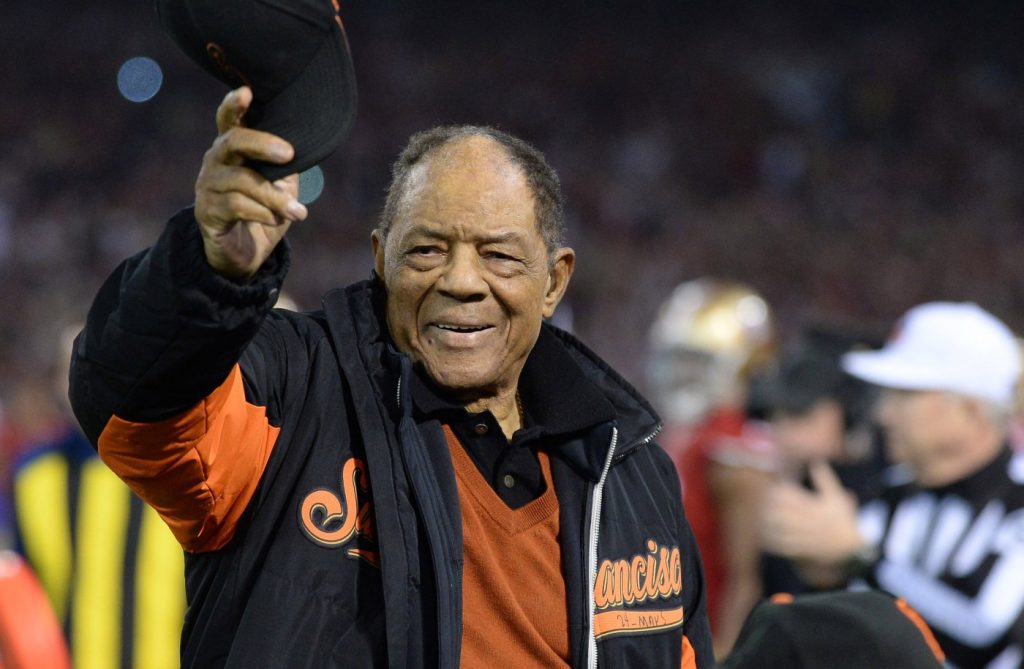Long Before Willie Mays dawned the black and orange with Giants across his chest, he was a Birmingham Black Baron.
His pro baseball origins started when he was a 17-year-old, playing for one of the greatest Negro League teams of all time. Though he was only a Barron for a short period of time one year, his stint with the Birmingham team changed baseball forever.
“If you think about it, the players that came out of the Negro Leagues [like Mays did], they weren’t just good. They were exceptional,” MLB Network analyst Harold Reynolds said to MLB.com in 2021. “The cream of the crop of athletes, Willie was the greatest.”
The Giants will play Thursday’s game at Rickwood Fields, the place where Mays got his start with the Barons. Though Mays will not be in attendance, he said he will be watching from the Bay Area in appreciation of the tribute from MLB.
“After all these years and it is still here,” Mays said in a statement posted on X/Twitter by the Giants on Monday. “So am I. How about that?”
“I wish I could come out to Rickwood Field this week to be with you all and enjoy that field with my friends. Rickwood’s been part of my life for all of my life. Since I was a kid. It was just ‘around the corner there’ from Fairfield and it felt like it had been there forever. Like a church. The first big thing I ever put my mind to was to play at Rickwood Field. It wasn’t a dream. It was something I was going to do. I was going to work hard to be one of the Birmingham Black Barons and play ball at Rickwood Field. That’s what I did.”
FILE – In this Aptil 30, 1961, file photo, San Francisco Giants star outfielder, Willie Mays, proudly displays the four baseballs in the clubhouse representing the four homers which he hit against the Milwaukee Braves in Milwaukee. The four homers tied the record of four homers in a single game held by nine other major league players at the time. The Giants won 14-4. Willie’s homers accounted for eight runs batted in.(AP Photo/File)
Mays’ talent was noticeable even in elementary school.
According to various accounts, when he was in fifth grade Mays held his own against players who were sophomores in high school. As a seventh grader, he came off the bench to play in Industrial League Games against grown men. So it was no surprise that he dominated players his own age once he was in high school.
Mays excelled at multiple sports, leading Fairfield Industrial High School’s football team to a state championship and becoming a star on the school’s basketball team. Even though baseball was his third best sport, those around Mays knew his future would be on the diamond.
“You play baseball and I’ll make sure you eat,” said Mays’ father, Howard “Cat” Mays Sr. in Willie Mays’ autobiography by James S. Hirsch titled “Willie Mays: The life, the legend.”
Since Fairfield Industrial didn’t have a baseball team, Mays had to play on local community teams. He dominated as a player for the Fairfield Gray Sox and earned his first pro opportunity playing for the the Chattanooga Choo Choos of the Negro Southern League – a minor league feeder team for the Birmingham Black Barons.
Though Mays enjoyed the chance to play pro ball, he had a hard time adjusting to the lifestyle that came with it. Along with the racism he endured, Hirsch wrote that Mays ate “stale bread and sardines” for team meals and saw players weren’t getting much money for the work they put in.
After a month, Mays quit the team and returned home.
But shortly after Mays’ departure from the Choo Choos, Cat Mays took his son to a tryout for the Black Barons after the team was in need of a fourth outfielder.
It didn’t take much for Mays to impress Birmingham in his tryout. After showing his potential as a twitchy outfielder with a rocket arm, Mays made the team.
In his first game as a Black Baron, Mays sat the bench. According to Hirsch, Davis told Mays to “watch what’s going on.”
On the same day in the second game of a double header against the Cleveland Buckeyes, Mays got his start. Davis wrote “MAYS, LF” on his lineup card and immediately drew skepticism from his own players who were already questioning why Mays was on a team with players 10 years older than he was.
“If anybody don’t like it, there’s the clubhouse, and you can go back in there and take off your uniform if you want to,” Davis said, according to Hirsch.
But after a solid performance, Mays was offered a contract and his teammates accepted him as one of their own.
“It was my start,” Mays said in the Monday statement. “My first job. You never forget that. Rickwood Field is where I played my first home game, and playing there was IT; everything I wanted.”
From there, Mays’ career skyrocketed. He was a true five-tool player that quickly caught the eye of Major League clubs from the New York Yankees to the Boston Red Sox.
Throughout the 1948 season, Mays continued to shine but was tested along the way. Opposing teams would often try to rattle the young outfielder by pitching to him inside and occasionally drilling him with fastballs.
Mays later said he developed his toughness playing in those situations.
“These men gave me my combat training,” Mays said to the Hartford Courant in 1981. “And what was combat training in the Negro Leagues? It was getting knocked down and either lying in the dirt and crying or getting up again.”
Life on the road for Mays and the Black Barons was just as difficult as it was on the field. Mays and his teammates were often treated as second class citizens everywhere they went and had to endure racism when finding places to eat or sleep on the road.
Players were still not making as much money as their MLB counterparts and did not get the same opportunities that other white players did, but Mays continued to excel on the field.
Later that year, Mays helped the Barons reach the Negro League World Series while batting .262 and showing off his exceptional fielding. He graduated from Fairfield High School in 1950 and the New York Giants bought out his contract from the Black Barons shortly after.
Mays’ signing came three years after Jackie Robinson broke the color barrier.
Mays went on to have a Hall of Fame career with the Giants. He played 22 seasons with the team and had some of his best seasons after the team moved to San Francisco in 1958.
Related Articles
Oakland A’s fans have a lot in common with Kansas City cousins when it comes to watching their team leave
After Melvin’s ejection, SF Giants rally to beat Cubs with Estrada’s big blast
SF Giants: Bochy, Melvin share their Willie Mays memories ahead of Rickwood Classic
SF Giants’ All-Star voting leader didn’t even start season on MLB roster
Twins’ late home run sends A’s back to Oakland winless on 7-game trip
He was a 24-time All-Star, two-time National League MVP, 12-time Golden Glove winner and a World Series champion in 1954 during his time as a pro. He was inducted into the baseball hall of fame in 1979.
Though he will be forever remembered as one of the greatest players in MLB history, his roots will forever be planted as a member of the Birmingham Black Barons.
“I’d like to be there, but I don’t move as well as I used to,” Mays said. “So I’m going to watch from my home. But it will be good to see that. I’m glad that the Giants, Cardinals and MLB are doing this, letting everyone get to see pro ball at Rickwood Field. Good to remind people of all the great ball that has been played there, and all the players.”
FILE – Fans watch a Double-A baseball game between the Montgomery Biscuits and the Birmingham Barons at Rickwood Field in Birmingham, Ala., May 29, 2019. The San Francisco Giants play against the St. Louis Cardinals in a Negro Leagues tribute game at Rickwood Field on June 20, 2024. (AP Photo/Jay Reeves, File)


